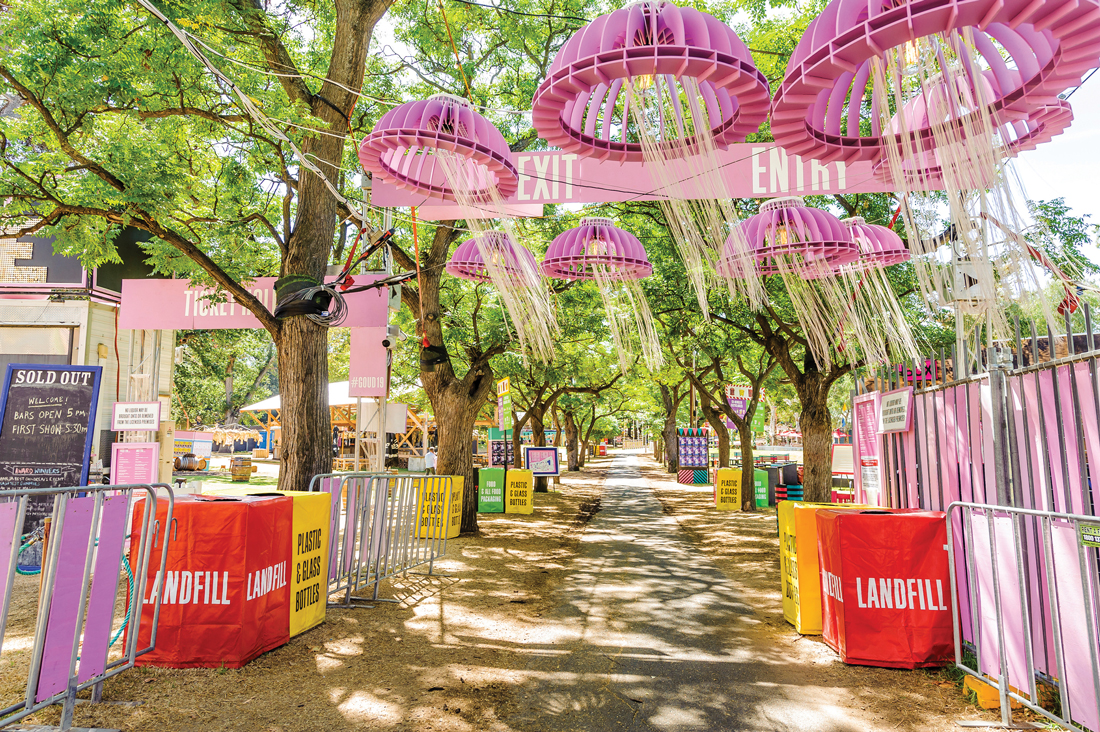Developing a Waste Management Plan (WMP) helps with planning and evaluation, supports contracting of waste management services, ensures more efficient use of resources, and allocates actions to responsible
parties. It can be reviewed after the event and used to plan future events or encourage continuous improvement.
As part of the event planning process, take a real or virtual ‘walkthrough’ of all areas of the venue to gather as much information as possible and detail:
- the activities that will be part of the event and the types of materials generated, or likely to be generated
- the estimated amount of each type of material
- any food and beverage areas, and high-traffic-flow areas
- waste collection locations and any existing waste and recycling infrastructure currently in place.
 Get advice from service providers on the best recycling system for your event, differentiating between front-of-house and back-of-house needs.
Get advice from service providers on the best recycling system for your event, differentiating between front-of-house and back-of-house needs.
For example, co-mingled recycling systems may be suitable front-of-house at some events where cardboard, wine bottles and clean rigid plastic packaging are likely to be generated (such as a picnic setting) but are otherwise best suited back-of-house for the collection of milk bottles, cardboard and metal containers.
Download a Waste Management Plan template that can be modified for your event.
Service providers also can provide specific assistance.
Specific issues
Understanding organics
At events, ‘organics’ are more than just the food and green waste we all put into household green bins. All food waste, serviette and napkins, compostable service ware, cardboard food trays, fibre-based straws and certified compostable packaging can be directed straight to the organics bin, simplifying systems and messaging.
What are certified compostable products?
Certified compostable products are made of materials that do not leave behind any toxic material, breaking down readily in a commercial composting system. This can include items that look like plastic such as bowls and cups. They will always state they are ‘certified compostable’. Australia has two of the highest standards in the world when it comes to certification:
Certified compostable products are clearly marked with these logos.
AS 4736 – this certifies the material can be composted through your green bin at a commercial compost facility.
AS 5810 - this certifies the material can be composted in your home compost bin.
What’s the difference?
Commercial compost facilities generate much more heat than a home compost bin, and use oxygen and water to break down materials into compost. Both AS 5810 and AS 4736 certified compostable products can be processed at commercial composting facilities.
As home composting systems do not reach the same high temperatures that are achieved at commercial composting facilities, only AS 5810 certified compostable products are suited to these systems.
Food and beverage service
Ensure vendors are aware of and meet the requirements of South Australia’s single-use plastics legislation. For more information on prohibited items and alternatives, see https://www.replacethewaste.sa.gov.au/event-management
Where single-use service ware is used, vendors should use only compostable service ware, with the exception of 10c drink containers. This simplifies the disposal messaging, reduces contamination, and avoids the need for laborious back-of-house sorting.
For further information on compostable service ware, visit www.replacethewaste.sa.gov.au and www. plasticfreesa.org
An alternative is to provide reusable food and beverage service ware, which is returned by patrons after use, but this requires greater coordination and appropriate washing facilities. An option is a fee for vendors to cover costs of hire and washing systems; this is offset by avoiding purchase of single-use options.
Drinking water
Event patrons are increasingly bringing reusable or refillable drink containers, and expect to find water refill stations. SA Water offers portable refill stations for large events. For information visit SA Water

Cigarette butts
If smoking is allowed in designated areas (check the Tobacco Products Regulation Act 1997 for requirements) provide designated bins for butts in these areas. Even if smoking is not allowed, provide bins at site entry points.
Disposable nappies
For certain events and venues, it is important that babychanging facilities with dedicated bins for nappies are provided. Alternatively, for public health reasons, patrons should place disposable nappies into a bag and in the landfill bin only.
Sporting events
If required, provide cups at hydration stations that are compostable or reusable and create strategically placed throw spots to minimise litter. Another innovative option to consider is hydration pods made from compostable material.
Multi-day and camping festivals
Broken or abandoned tents and chairs are bulky, so take this into account when calculating landfill bin requirements. Through promotional material and in the closing stages of the event encourage patrons to take such materials with them.
Animal exhibits
Ensure that organics bins are provided in convenient and accessible locations for exhibitors to dispose of animal waste streams.
Event bump in/out
If not able to be reused, untreated timber and pallets can be sent for organics recycling. Check with your waste management contractor about how these can be collected.
Large quantities of clean, soft plastics, such as pallet wrap, ice bags and packaging, often arrive on site.
If this is expected at an event, include this recycling stream in discussions with waste contractors.
Lighting, e-waste, batteries, gas bottles
These materials are banned from landfill in SA. Check with your waste management contractor about specialised recycling collection services or the items can be taken to collection locations (e.g., councils, recycling centres).
Liquid waste
Liquid waste, such as cooking oil and washing-up water, will require special consideration. To avoid vendors disposing of liquid waste inappropriately, estimate how much will be produced and organise drums for disposal through commercial oil recyclers or waste management contractors.

